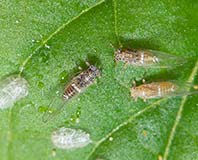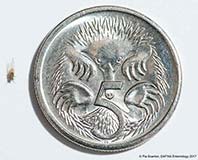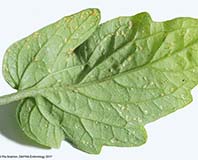Read the latest information on
Foot-and-mouth disease

Tomato potato psyllid nymph and adults on a leaf. Nymph cases also pictured. Photo: Pia Scanlon, DAFWA Entomology 2017
The Department of Agriculture and Food in WA has started surveillance in commercial crops and backyard gardens in the Perth area, looking for signs of a new vegetable pest.
Department Acting Chief Plant Protection Officer Sonya Broughton said officers were working with the horticulture industry to respond to the exotic plant pest, tomato potato psyllid (Bactericera cockerelli).
Residential and commercial properties, a commercial nursery and retail outlets are now confirmed to have the pest. This is the first time the psyllid has been detected in Australia, and so far, it has not been found outside of the Perth metropolitan area.
“The department has quarantined the affected properties and restricted the movement of plant material, equipment and machinery off these properties,” said Dr Broughton.
The infested properties will also be treated to eliminate the pest.
Tomato potato psyllid attacks a range of plants in the Solanaceae family including potato, tomato, eggplant, capsicum, chilli and tamarillo, along with sweet potato.

Tomato potato psyllid next to a five cent piece. Photo: Pia Scanlon, DAFWA Entomology 2017
“Tomato potato psyllid is a tiny sap-sucking insect. Adult psyllids resemble small winged aphids in appearance and are about 3mm long,” Dr Broughton said.
“The body is brownish and has white or yellowish markings on the thorax and a broad white band on the abdomen. Its wings are transparent and held vertically over the body.
“Symptoms of damage on plants can include stunting, yellowing and purpling of leaves, distorted leaf growth and stem death. (More information about the pest)
“Growers who suspect the pest is on their property are advised not to spray for the pest or disturb plants until their crops have been surveyed and an appropriate treatment has been identified.”
The insect can carry the bacterium Candidatus Liberibacter solanacearum, which causes the disease ‘zebra chip’ in potatoes. The bacterium has not been found in any samples taken to date.
Commercial vegetable producers and backyard growers are urged to check for signs of the psyllid and report anything unusual to the Exotic Plant Pest Hotline 1800 084 881.
People in WA can also lodge a report via the department website or by contacting the department’s Pest and Disease Information Service info@agric.wa.gov.au, or use the MyPestGuide Reporter app.
VegetablesWA CEO John Shannon said WA’s horticulture industry was critically important to the state’s economy.

Tomato potato psyllid nymphs on the under side of a tomato leaf. Photo: Pia Scanlon, DAFWA Entomology 2017
“We have access to international expertise which will help us to best respond to this new pest and we will work closely with the department to share this expertise with growers,” Mr Shannon said.
Department Chief Plant Biosecurity Officer John van Schagen said: “In addition to current surveillance and movement restrictions on the affected properties, a Quarantine Area Notice is now in place for the Perth area, to prevent the spread of tomato potato psyllid to other parts of the state.
“The Notice requires treatment or certification of host material and potential carriers before movement outside of this specified area.”
To assist with the continuation of trade for commercial growers, the WA department will use the surveillance data to declare areas of freedom, where it is confirmed that the pest is not present.
Controls on movement of risk material between Australian states and territories are being implemented. New South Wales, South Australia and Queensland have introduced controls on the movement of risk material, and other jurisdictions are considering doing the same.
If you are planning to move host material interstate you need to check with your state or territory department of agriculture or primary industries to see if any of these restrictions affect you, or check the Australian Interstate Quarantine website for quarantine regulator contact details.
There are no international trade restrictions at this time. The Australian Government Department of Agriculture and Water Resources will manage any overseas trade issues, should they arise.
As a general reminder, all growers need to practise sound farm biosecurity to prevent the entry, establishment and spread of pests and diseases.
Vegetable growers who need biosecurity advice can contact AUSVEG Biosecurity Officers Jessica Lye or Callum Fletcher.
Acknowledgement: This article was compiled from information provided by the Department of Agriculture and Food WA and the Consultative Committee on Emergency Plant Pests.